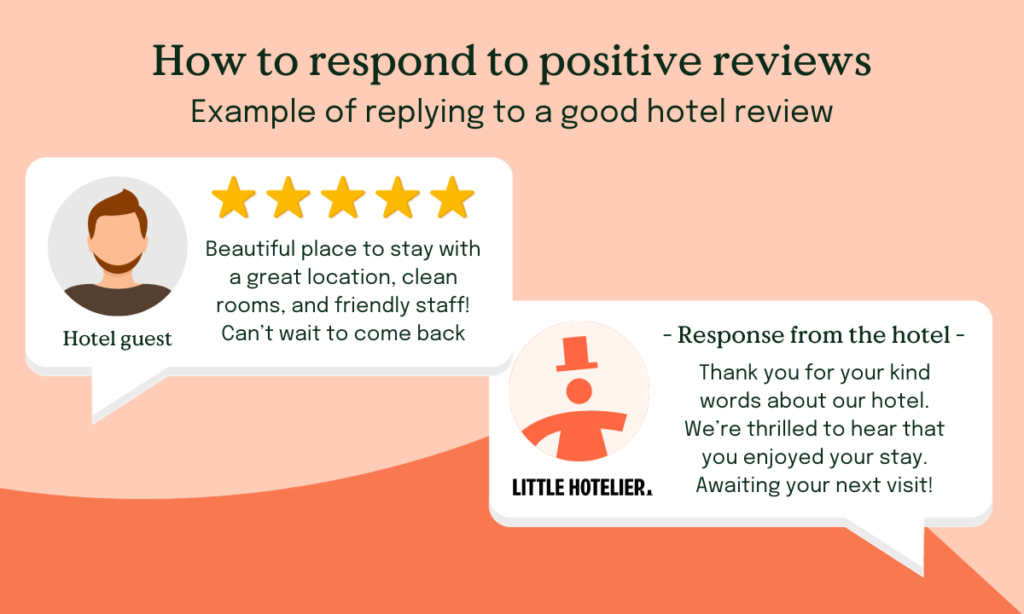The internet has given travellers access to hotels in every part of the world. But how to sort the good from the bad when there are often hundreds of options in any given area? The system that the internet has settled on is as simple as it is effective: guest reviews.
Hoteliers often feel the need to respond to negative reviews, while positive reviews are more likely to be left ignored. However, it’s just as important to reply to positive feedback.
In this article we’ll look at how to respond to positive reviews, including why, how and how often you should do it.
More direct bookings, less OTA commissions
Want to manage all your bookings in one place? Capture more online reservations when you enable guests to book with your hotel directly.
Learn moreWhy are positive hotel reviews important?
Reviews can define the success of your hotel, and for a few good reasons:
- 90% of people check online reviews before visiting businesses.
- 88% of consumers trust online reviews as much as recommendations from loved ones.
- Customers spend 31% more at businesses with ‘excellent’ reviews.
Hotel reviews create a particularly valuable currency for travellers, who are often unfamiliar with the area they’re travelling to, and will rarely have personal contacts to give them advice on where to stay. They instead use the internet to discover what travellers like themselves have to say about the hotel options in the area.
As part of this process, a traveller will compare overall ratings, read individual reviews and check for responses from the hotel.
The importance of positive hotel reviews and responses means that a hotelier should encourage guests to post reviews across all relevant channels – Facebook, Google, TripAdvisor and individual OTAs – and respond to them where relevant. A hotel property management system like Little Hotelier can make this otherwise time-consuming process incredibly efficient.
Why is it important to respond to positive reviews?
The reasons to respond to positive hotel reviews may not be immediately obvious – why not leave the review be and let it speak for itself?
Often that approach is absolutely fine – we don’t advocate that a hotel respond to every single positive review (more on that later). It is however important that a hotel responds to positive reviews semi-regularly.
Business success is increasingly predicated on building an online community, whether in the form of social media followers, email subscribers or loyal returning customers. Responding to positive reviews, particularly those that are detailed or personalised, is a great way to make people feel seen and build a passionate captive audience.
How you respond to reviews can tell potential guests a lot about your hotel. It offers insight into your personality, your values and the way you operate.
Finally, responding to hotel reviews, whether positive, negative or mixed, is simply good business. According to a study by TripAdvisor, hotels that respond to reviews are 21% more likely to receive a booking inquiry than those that don’t.
How do you comment on good hotel service?
Taking a compliment can be a surprisingly tricky affair. Your response must be personalised, humble, and most importantly, worth writing – simply saying ‘thanks!’ after every five-star review can do your brand more harm than good.
There are a few basic rules to keep in mind when forming a response to a positive review:
- Use ‘we’, not ‘I’: How to respond to reviews differs slightly between positive and negative. It’s wise to address negative hotel reviews as an individual – ideally the manager – so that someone is shown to take responsibility. The glow of a positive review, however, should be shared by the whole team, as it was a group effort to make it happen.
- Personalise every message: Never copy and paste your responses. Readers can smell a templated reply from a mile away, so be sure to address the reviewer by name and reference some points they brought up in their review.
- Stay humble: While it can be tempting for a hotel to puff out its collective chest and bask in the glow of a great review, it’s important to respond in an effusive way. Thank the guest, humbly take their compliments, and mention that you’re doing all you can to make every stay a memorable one.

How should hotels respond to positive reviews?
A tried and tested technique is to thank, address the feedback, and thank again.
- Thank the reviewer: Begin by addressing the guest by name – or if they don’t give their actual name, by their username – and thanking them for taking the time to post a review.
- Emphasise specifics: Dig into the meat of the review and reiterate a few of the guest’s points. Say that you’re happy that the guest enjoyed X, Y and Z during their stay. This tells both the reviewer and readers of the page that you thoroughly read and digested the review, and that you’re truly appreciative of it, which can encourage more people to do the same.
- Thank again and invite them back: Complete the sandwich by thanking the guest again and letting them know that they’re welcome back any time.
A positive hotel review response example:
“Thank you so much for taking the time to post a review, Debbie!
We are so happy to hear that you enjoyed your stay with us, and that our comfy beds and friendly staff were particular highlights. We work really hard to give our guests the finest experience possible, so comments like yours are truly rewarding to hear.
We’d love to welcome you back soon, so don’t be a stranger. Thanks again!
– The A1 Hotel team.”
Should you respond to every positive review?
While regularly responding to hotel reviews is important, that doesn’t mean you need to reply to every single one, particularly those that are positive.
Cornell University found that the sweet spot for review response rate is 40-50%. By replying to a little under half of all reviews you show that you are taking an active interest in what guests are saying about your hotel, but not in a way that makes it seem like a job.
Which reviews should you focus on? The following order of priority will direct your efforts in the most effective way:
- Negative reviews
- Mixed reviews (those that have both positive and negative elements)
- Detailed positive reviews
- Generic positive reviews (those that don’t say much beyond the rating)
A better way to manage guest feedback
The task of responding to guest feedback is uniquely challenging for hotels because there are so many review platforms to manage. While other businesses might only be rated on Google and Facebook, a hotel will appear on TripAdvisor and any number of OTAs, such as booking.com, Expedia, Airbnb.
But this challenge is far from insurmountable, particularly if you have the right tech.
Little Hotelier’s channel manager offers one-click control over your online reputation, pricing, availability and more. It can integrate 450+ booking channels and distil them into a single, simple portal, from which you can manage everything.
Ready to make the most of guest reviews with Little Hotelier? Start your free 30-day trial!
Effortlessly deliver the best guest experience
See how you can easily stay on top of daily operations, garner more positive reviews, and increase hotel bookings.
Watch a quick demo
By Dean Elphick
Dean is the Senior Content Marketing Specialist of Little Hotelier, the all-in-one software solution purpose-built to make the lives of small accommodation providers easier. Dean has made writing and creating content his passion for the entirety of his professional life, which includes more than six years at Little Hotelier. Through content, Dean aims to provide education, inspiration, assistance, and, ultimately, value for small accommodation businesses looking to improve the way they run their operations (and live their life).
Table of contents
“Little Hotelier is professional and much appreciated. For a small hotel like ours, the ability to quickly change rates and availability is crucial.”
Owner, Soloqui in Zero Branco






